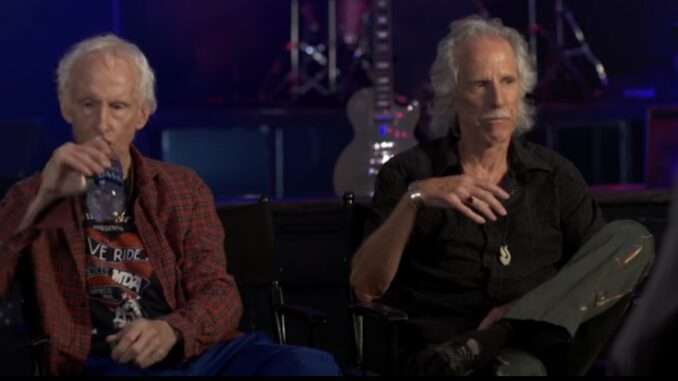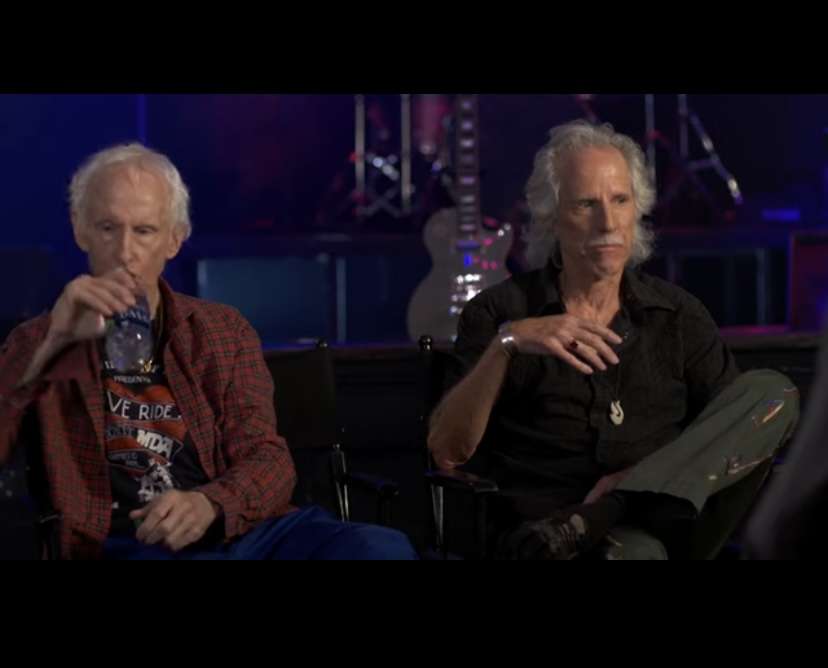
The Doors, formed in 1965, became one of the most influential rock bands of all time, creating timeless music that captured the spirit of the 1960s. With their eclectic fusion of rock, blues, jazz, and psychedelia, the band’s impact is still felt in today’s musical landscape. Central to their legacy was their enigmatic frontman, Jim Morrison, whose poetic lyrics and magnetic presence defined their sound. The band’s journey to greatness began with a chance meeting between Morrison and two of the band’s key members, guitarist Robby Krieger and drummer John Densmore.
Both Krieger and Densmore have shared their memories of meeting Morrison, offering insights into their initial impressions of the man who would help define an era of rock music. Their recollections reveal the intrigue, uncertainty, and eventual admiration that Morrison inspired in his bandmates.
John Densmore’s First Encounter with Jim Morrison
John Densmore’s first meeting with Jim Morrison occurred in 1965, when he and keyboardist Ray Manzarek were introduced to Morrison. Ray had been familiar with Jim’s poetry and had been hoping to form a band with him for some time. It was a casual meeting
“When I first met Jim, I was unsure about him,” Densmore admitted. “He wasn’t what I expected. He had a quiet, almost aloof demeanor, and there was something mysterious about him. But there was also an intensity. He was very much his own person, someone who was not easily understood.”
It wasn’t until Jim began to sing one of his own songs, *Moonlight Drive*, that Densmore began to understand why Morrison was so different from anyone he had met before.
“Jim started singing ‘Moonlight Drive,’ and it was clear to me that he had something special,” Densmore said. “It wasn’t just his voice—it was the depth in his lyrics, the way his words captured an entire world of longing and existential exploration. I immediately knew there was something unique about this guy. He had this vision that we could all connect to.”
Densmore’s early impressions of Morrison centered around his aura of mystery and the raw emotion in his music. Jim wasn’t just a singer—he was a poet and a philosopher, someone who could channel intense, often dark, emotions into his music. This made Densmore eager to be part of the collaboration, despite not fully knowing what to expect from Morrison as a person.
Robby Krieger’s First Encounter with Jim Morrison
Robby Krieger’s first meeting with Jim Morrison took place under somewhat different circumstances. It happened at a party, where Krieger was playing guitar. Morrison, who had already begun writing poetry and lyrics, attended the event and introduced himself to Krieger. While their first conversation was brief, Krieger immediately noticed Jim’s presence.
“I remember meeting him and thinking he was a little strange, but also incredibly interesting,” Krieger reflected. “He had this quiet confidence about him, and when he spoke, it was like he wasn’t just talking about the world—he was looking at it from a different perspective. He wasn’t like anyone I knew. There was an edge to him, something that made you want to know more.”
Despite this initial uncertainty, Krieger soon became captivated by Jim’s artistic vision. Morrison wasn’t just interested in writing songs; he wanted to create something deeper, something more poetic. For Krieger, it was Morrison’s songwriting that convinced him to be a part of the journey.
“He had this rawness to his lyrics, this honesty that was hard to ignore,” Krieger said. “When he started talking about his poetry and how he wanted to use music to express it, I was hooked. I wanted to be a part of it.”
Krieger, who was primarily focused on his guitar playing, quickly saw the potential in working with someone who had such a deep understanding of music and art. While Jim’s personality was unconventional, Krieger could tell that they shared a common musical vision, even if they didn’t yet know where it would lead.
The Magnetic Pull of Jim Morrison
Both Krieger and Densmore acknowledged that while Jim Morrison’s persona could be challenging to understand, there was something magnetic about him that drew them in. It wasn’t just his singing voice—it was the poetry of his lyrics, the raw emotional intensity he brought to every performance, and the way his presence could command a room.
In the years following their first meeting, Krieger, Densmore, and Morrison would come to form an unbreakable creative bond. The unique personalities of each band member—Ray Manzarek’s soulful keyboard playing, Krieger’s guitar mastery, Densmore’s complex drumming, and Morrison’s philosophical lyrics—came together to create a sound that was unlike anything else in rock music.
While Morrison’s dark and unpredictable nature often tested the band’s patience, it also fueled their creativity. Jim’s willingness to embrace chaos, to delve into the deepest corners of his mind and the human experience, helped define the band’s approach to music. His sometimes erratic behavior was, in many ways, an extension of the emotion he poured into his work.
The Doors’ Legacy
Looking back, both Krieger and Densmore recognize that meeting Jim Morrison marked the beginning of something extraordinary. Despite their initial reservations, they quickly realized that Morrison was a once-in-a-generation talent whose vision would lead to the creation of some of the most influential music ever recorded. The Doors’ music, from “Light My Fire” to “Riders on the Storm,” continues to inspire new generations of fans and musicians alike.
Reflecting on the formation of the band, Densmore summed it up: “Meeting Jim was like meeting someone from another planet. But once we started playing together, everything clicked. He brought something to the table that none of us could have predicted, but all of us needed.”
The partnership between Krieger, Densmore, Manzarek, and Morrison produced a body of work that transcends time. The Doors’ music lives on, forever capturing the spirit of their time and the genius of the man who forever changed the face of rock music.
Leave a Reply